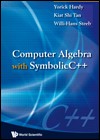World Scientific, Singapore, 2008.
ISBN: 978-981-283-360-0
Yorick Hardy
School of Mathematics
University of the Witwatersrand, Johannesburg
South Africa
Tan Kiat Shi
Ilog Co., Ltd, Singapore
Willi-Hans Steeb
International School for Scientific Computing
University of Johannesburg, South Africa
|
Some of the improvements and features of SymbolicC++ 3:
- Source code completely rewritten.
- All memory management in a single class
- Rationals, Verylong, double and complex completely integrated
- Symbolic matrices and vectors completely integrated
- Improved algorithms for simplification, expansion, chain rule etc.
- Extensive use of STL
Development version (mercurial)
Current version (2010-09-15):
Book version:
Other documentation:
Users of SymbolicC++ with GCC on 64-bit may need to use
the -fno-elide-constructors flag.
|
SymbolicC++ uses C++ and object-oriented programming
to develop a computer algebra system.
Object-oriented programming is an approach to software
design that is based on classes rather than procedures. This
approach maximizes modularity and information hiding. Object-oriented
design provides many advantages. For example, it combines
both the data and the functions that operate
on that data into a single unit. Such a unit (abstract data type)
is called a class.
We use C++ as our object-oriented programming language
for the following reasons:
C++ allows the introduction of abstract data types.
Thus we can introduce the data types used in the computer
algebra system as abstract data types.
The language C++ supports the central concepts of object-oriented
programming: encapsulation, inheritance,
polymorphism (including dynamic binding) and operator overloading.
It has good support for dynamic memory management and supports both,
procedural and object-oriented programming. A less abstract form of
polymorphism is provided via template support.
We overload the operators
=, +, -, *, /
etc for our abstract data types, such as verylong integers, rational numbers,
complex numbers or symbolic data types.
The vector and matrix classes are implemented on a template
basis so that they can be used with the other abstract data types.
Another advantage of this approach is that, since the system of symbolic
manipulations itself is written in C++, it is easy to enlarge it and to
fit it to the special problem at hand. The classes (abstract data types)
are included in a header file and can be provided in any C++ program by
giving the command
#include "ADT.h"
at the beginning of the program.
For the realization of this concept we apply the following features of C++:
- The class concept
- overloading of operators
- overloading of functions
- inheritance of classes
- virtual functions
- function templates
- class templates
- Standard Template Library
The developed system SymbolicC++ includes the following
abstract data types (classes):
-
Verylong: handles very long integers
-
Rational: template class that handles rational numbers
-
Quaternion: template class that handles quaternions
-
Derive: template class to handle exact differentiation
-
Vector: template class that handles vectors
-
Matrix: template class that handles matrices
-
Array: template class that handles multi-dimensional arrays
-
List: template class that handles linked lists
-
Set: template class that handles finite sets
-
Polynomial: template class that handles univariate polynomials
-
Multinomial: template class that handles multivariate polynomials
-
Symbolic: class that handles symbolic manipulations, such as
rules, simplifications, differentiation, integration,
commutativity and non-commutativity
-
Equation: class that represents symbolic equations
-
Type: handles the atom a LISP system
-
Pair: handles the dotted pair for a LISP system,
all the standard LISP functions are included
Suitable type conversions between the abstract data types
and between abstract data types and basic data types are also provided.
The advantages of SymbolicC++ are as follows:
- Object-oriented design and proper handling of basic and abstract
data types.
- The system is operating system independent, i.e. for all
operating systems powerful C++ compilers are available.
- The user is provided with the source code.
- New classes (abstract data types) can easily be added.
- The ANSI C++ standard is taken into account.
- The user only needs to learn C++ to apply the computer algebra system.
- Assembler code can easily be added to run on a specific CPU.
- Member functions and type conversion operators provide
a symbolic-numeric interface
- The classes (abstract data types) are included in a header file
and can be provided in any C++ program by giving the command
#include "ADT.h"
at the beginning of the program.
- The classes can be linked with Parallel Virtual Machine (PVM).
- Standard Template Library can be used with SymbolicC++.
